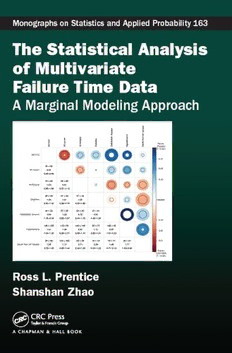
The Statistical Analysis Of Multivariate Failure Time Data: A Marginal Modeling Approach PDF
Preview The Statistical Analysis Of Multivariate Failure Time Data: A Marginal Modeling Approach
The Statistical Analysis of Multivariate Failure Time Data A Marginal Modeling Approach MONOGRAPHS ON STATISTICS AND APPLIED PROBABILITY Editors: F. Bunea, P. Fryzlewicz, R. Henderson, N. Keiding, T. Louis, R. Smith, and W. Wong Recently Published Titles Asymptotic Analysis of Mixed Effects Models Theory, Applications, and Open Problems Jiming Jiang 155 Missing and Modified Data in Nonparametric Estimation with R Examples Sam Efromovich 156 Probabilistic Foundations of Statistical Network Analysis Harry Crane 157 Multistate Models for the Analysis of Life History Data Richard J. Cook and Jerald F. Lawless 158 Nonparametric Models for Longitudinal Data with Implementation in R Colin O. Wu and Xin Tian 159 Multivariate Kernel Smoothing and Its Applications José E. Chacón and Tarn Duong 160 Sufficient Dimension Reduction Methods and Applications with R Bing Li 161 Large Covariance and Autocovariance Matrices Arup Bose and Monika Bhattacharjee 162 The Statistical Analysis of Multivariate Failure Time Data: A Marginal Modeling Approach Ross L. Prentice and Shanshan Zhao 163 For more information about this series please visit: http://crcpress.com/go/monographs The Statistical Analysis of Multivariate Failure Time Data A Marginal Modeling Approach Ross L. Prentice Shanshan Zhao CRC Press Taylor & Francis Group 6000 Broken Sound Parkway NW, Suite 300 Boca Raton, FL 33487-2742 © 2019 by Taylor & Francis Group, LLC CRC Press is an imprint of Taylor & Francis Group, an Informa business No claim to original U.S. Government works Printed on acid-free paper Version Date: 20190416 International Standard Book Number-13: 978-1-482-256557-4 (Hardback) This book contains information obtained from authentic and highly regarded sources. Reason- able efforts have been made to publish reliable data and information, but the author and publisher cannot assume responsibility for the validity of all materials or the consequences of their use. The authors and publishers have attempted to trace the copyright holders of all material reproduced in this publication and apologize to copyright holders if permission to publish in this form has not been obtained. If any copyright material has not been acknowledged please write and let us know so we may rectify in any future reprint. Except as permitted under U.S. Copyright Law, no part of this book may be reprinted, reproduced, transmitted, or utilized in any form by any electronic, mechanical, or other means, now known or hereafter invented, including photocopying, microfilming, and recording, or in any information storage or retrieval system, without written permission from the publishers. For permission to photocopy or use material electronically from this work, please access www. copyright.com (http://www.copyright.com/) or contact the Copyright Clearance Center, Inc. (CCC), 222 Rosewood Drive, Danvers, MA 01923, 978-750-8400. CCC is a not-for-profit organiza- tion that provides licenses and registration for a variety of users. For organizations that have been granted a photocopy license by the CCC, a separate system of payment has been arranged. Trademark Notice: Product or corporate names may be trademarks or registered trademarks, and are used only for identification and explanation without intent to infringe. Visit the Taylor & Francis Web site at http://www.taylorandfrancis.com and the CRC Press Web site at http://www.crcpress.com To our spouses, children, and grandchildren. Contents Preface xi 1 IntroductionandCharacterizationofMultivariateFailureTimeDis- tributions 1 1.1 FailureTimeDataandDistributions 1 1.2 BivariateFailureTimeDataandDistributions 4 1.3 BivariateFailureTimeRegressionModeling 8 1.4 HigherDimensionalFailureTimeDataandDistributions 9 1.5 MultivariateResponseData:ModelingandAnalysis 11 1.6 RecurrentEventCharacterizationandModeling 12 1.7 SomeApplicationSettings 13 1.7.1 Aplasticanemiaclinicaltrial 13 1.7.2 Australiantwindata 14 1.7.3 Women’sHealthInitiativehormonetherapytrial 15 1.7.4 Bladdertumorrecurrencedata 17 1.7.5 Women’sHealthInitiativedietarymodificationtrial 19 2 UnivariateFailureTimeDataAnalysisMethods 25 2.1 Overview 25 2.2 NonparametricSurvivorFunctionEstimation 25 2.3 HazardRatioRegressionEstimationUsingtheCoxModel 28 2.4 CoxModelPropertiesandGeneralizations 31 2.5 CensoredDataRankTests 32 2.6 CohortSamplingandDependentCensoring 33 2.7 AplasticAnemiaClinicalTrialApplication 35 2.8 WHIPostmenopausalHormoneTherapyApplication 36 2.9 AsymptoticDistributionTheory 40 2.10 AdditionalUnivariateFailureTimeModelsandMethods 44 2.11 ACox-LogisticModelforContinuous,DiscreteorMixedFailure TimeData 45 3 NonparametricEstimationoftheBivariateSurvivorFunction 51 3.1 Introduction 51 3.2 Plug-InNonparametricEstimatorsofF 52 3.2.1 TheVolterraestimator 52 3.2.2 TheDabrowskaandPrentice–Caiestimators 55 vii viii 3.2.3 Simulationevaluation 57 3.2.4 Asymptoticdistributionalresults 59 3.3 MaximumLikelihoodandEstimatingEquationApproaches 60 3.4 NonparametricAssessmentofDependency 62 3.4.1 Crossratioandconcordancefunctionestimators 62 3.4.2 Australiantwinstudyillustration 63 3.4.3 Simulationevaluation 65 3.5 AdditionalEstimatorsandEstimationPerspectives 65 3.5.1 Additionalbivariatesurvivorfunctionestimators 65 3.5.2 Estimationperspectives 67 4 RegressionAnalysisofBivariateFailureTimeData 71 4.1 Introduction 71 4.2 IndependentCensoringandLikelihood-BasedInference 72 4.3 CopulaModelsandEstimationMethods 74 4.3.1 Formulation 74 4.3.2 Likelihood-basedestimation 75 4.3.3 Unbiasedestimatingequations 76 4.4 FrailtyModelsandEstimationMethods 78 4.5 AustralianTwinStudyIllustration 79 4.6 RegressiononSingleandDualOutcomeHazardRates 79 4.6.1 Semiparametricregressionmodelpossibilities 79 4.6.2 Cox models for marginal single and dual outcome hazard rates 80 4.6.3 Dependencymeasuresgivencovariates 82 4.6.4 Asymptoticdistributiontheory 82 4.6.5 Simulationevaluationofmarginalhazardrateestimators 85 4.7 BreastCancerFollowedbyDeathintheWHILow-FatDietInter- ventionTrial 89 4.8 CountingProcessIntensityModeling 91 4.9 MarginalHazardRateRegressioninContext 92 4.9.1 Likelihoodmaximizationandempiricalplug-inestimators 92 4.9.2 Independentcensoringanddeathoutcomes 92 4.9.3 Marginalhazardratesforcompetingriskdata 93 4.10 Summary 94 5 TrivariateFailureTimeDataModelingandAnalysis 99 5.1 Introduction 99 5.2 NonparametricEstimationoftheTrivariateSurvivorFunction 100 5.2.1 Dabrowska-typeestimatordevelopment 100 5.2.2 Volterraestimator 104 5.2.3 Trivariatedependencyassessment 105 5.2.4 Simulationevaluationandcomparison 106 5.3 TrivariateRegressionAnalysisviaCopulas 109 ix 5.4 RegressiononMarginalSingle,DoubleandTripleFailureHazard Rates 110 5.5 SimulationEvaluationofHazardRatioEstimators 113 5.6 PostmenopausalHormoneTherapyinRelationtoCVDandMortal- ity 115 6 HigherDimensionalFailureTimeDataModelingandEstimation 119 6.1 Introduction 119 6.2 NonparametricEstimationofthem-DimensionalSurvivorFunction 120 6.2.1 Dabrowska-typeestimatordevelopment 120 6.2.2 Volterranonparametricsurvivorfunctionestimator 123 6.2.3 Multivariatedependencyassessment 124 6.3 RegressionAnalysisonMarginalSingleFailureHazardRates 125 6.4 RegressiononMarginalHazardRatesandDependencies 129 6.4.1 Likelihoodspecification 129 6.4.2 Estimationusingcopulamodels 130 6.5 MarginalSingleandDoubleFailureHazardRateModeling 133 6.6 CountingProcessIntensityModelingandEstimation 136 6.7 Women’sHealthInitiativeHormoneTherapyIllustration 137 6.8 MoreonEstimatingEquationsandLikelihood 140 7 RecurrentEventDataAnalysisMethods 143 7.1 Introduction 143 7.2 IntensityProcessModelingonaSingleFailureTimeAxis 144 7.2.1 Countingprocessintensitymodelingandestimation 144 7.2.2 Bladdertumorrecurrenceillustration 146 7.2.3 Intensitymodelingwithmultiplefailuretypes 148 7.3 MarginalFailureRateEstimationwithRecurrentEvents 149 7.4 SingleandDoubleFailureRateModelsforRecurrentEvents 151 7.5 WHIDietaryModificationTrialIllustration 151 7.6 AbsoluteFailureRatesandMeanModelsforRecurrentEvents 152 7.7 Perspective on Regression Modeling via Intensities and Marginal Models 153 8 AdditionalImportantMultivariateFailureTimeTopics 157 8.1 Introduction 157 8.2 DependentCensorship,ConfoundingandMediation 158 8.2.1 Dependentcensorship 158 8.2.2 Confoundingcontrolandmediationanalysis 164 8.3 CohortSamplingandMissingCovariates 166 8.3.1 Introduction 166 8.3.2 Case-cohortandtwo-phasesampling 166 8.3.3 Nestedcase–controlsampling 169 8.3.4 Missingcovariatedatamethods 170 8.4 MismeasuredCovariateData 171
